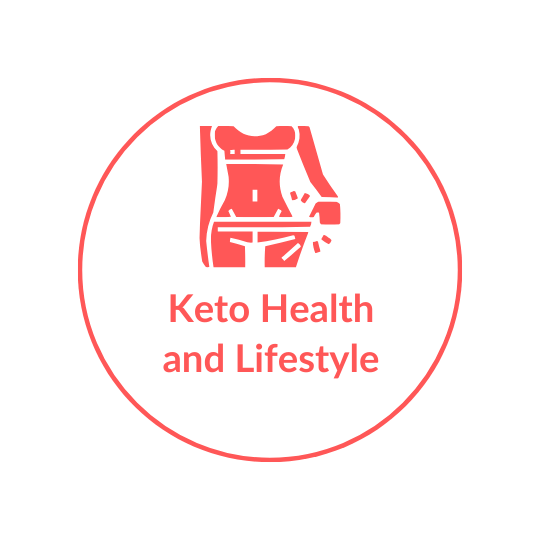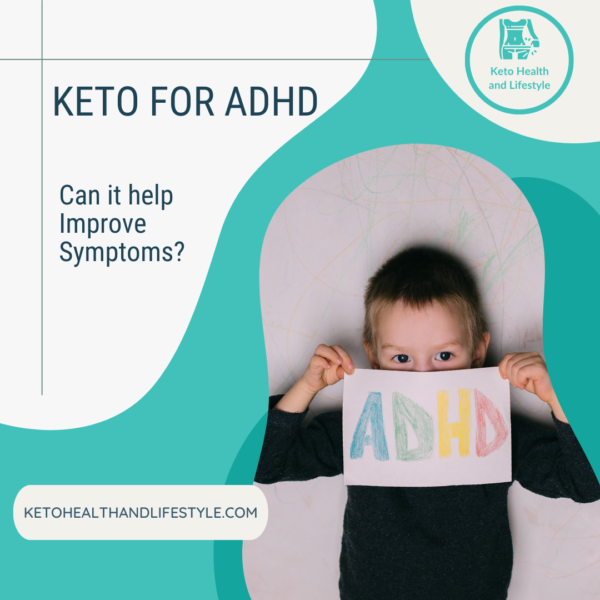This post may contain affiliate links which means I may receive a commission for purchases made through links. Learn more about policies on my about page.
Have you ever considered whether the keto diet could play a role in managing ADHD symptoms? As awareness around nutritional approaches to mental health grows, the ketogenic diet is gaining attention not just for weight management but for its potential influence on conditions like ADHD. Emerging research suggests a fascinating link between keto for ADHD improvements in symptoms, driven by changes in brain function and gut health. While studies continue to explore this connection, it’s worth understanding how a high-fat, low-carb lifestyle might serve as a tool in managing ADHD. Stay with us as we explore the science and potential benefits behind this compelling approach.
Table of Contents
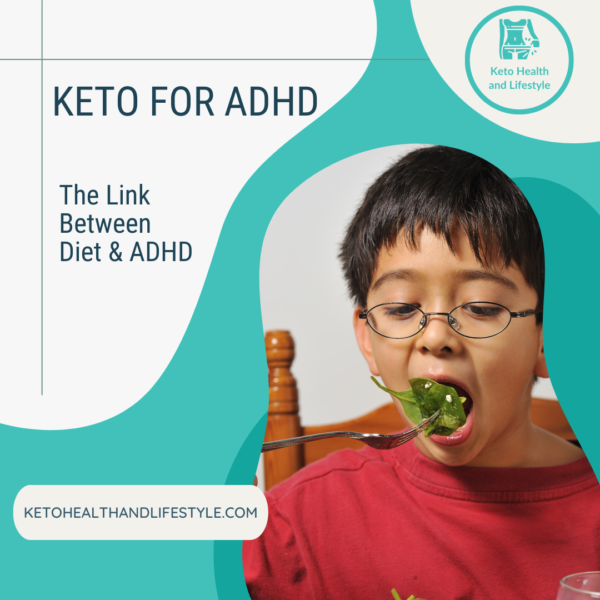
The Link Between Diet and ADHD
Understanding how diet affects ADHD is like piecing together a puzzle. While food might not be a direct cause, it can influence how symptoms show up. Let’s look at some important parts where diet and ADHD interact.
Nutritional Deficiencies and ADHD
Nutritional deficiencies can play a huge role in ADHD symptoms. Children with ADHD often show deficiencies in key nutrients such as vitamin D, omega fatty acids, magnesium, and zinc. These nutrients are like fuel for the brain, helping it function smoothly. Imagine your brain as a car engine—without the right fuel, it sputters and fails.
- Vitamin D: It’s found that 78.4% of children with ADHD are deficient in vitamin D compared to 48% of children without ADHD. This vitamin supports brain health and low levels are linked to increased ADHD symptoms. Learn more about common nutrient deficiencies in ADHD.
- Omega 3 and Omega 6: These essential fats help with brain connectivity and communication. A lack of these may lead to concentration and attention issues.
- Magnesium and Zinc: Both minerals are vital for neurotransmitter function. Deficiencies can worsen hyperactivity and impulsivity. Research also shows that patients with ADHD may have decreased levels of these minerals according to this study.
These nutrients are like the oil and electricity keeping your brain’s car running. Without them, you’re more likely to hit roadblocks.
The Role of Blood Sugar Levels
Blood sugar levels are another piece of the puzzle when it comes to ADHD symptoms. Imagine your blood sugar like a roller coaster—when it goes up and down too rapidly, it affects your mood and attention. Here’s why it matters:
- Fluctuations in Blood Sugar: When blood sugar spikes, it can lead to bursts of energy followed by crashes. These ups and downs can impact attention and behaviour, especially in those with ADHD. Just like keeping a car in gear, maintaining stable blood sugar helps keep your brain on track.
- Emotional Reactivity: Unstable glucose levels can make individuals with ADHD more reactive and impulsive. Research shows that glucose levels affect key brain chemicals important to ADHD as explained here.
- Self-Control and Focus: Managing glucose levels can assist in improving self-control and focus, two areas often challenged by ADHD. By keeping sugar levels even, it’s easier to manage symptoms effectively according to some studies.
Finding the right balance in diet can be like tuning a finely-crafted machine, providing the stability needed to manage ADHD symptoms effectively. By ensuring adequate nutrients and stable blood sugar, we can make the journey a bit smoother.
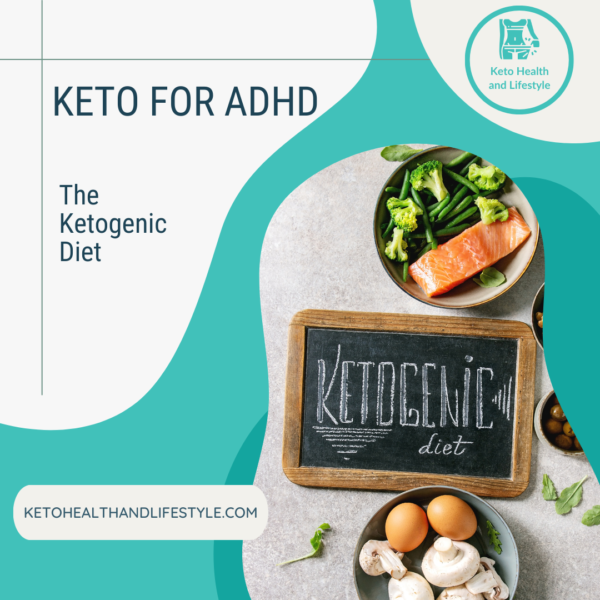
What is the Ketogenic Diet?
The ketogenic diet, also known as the keto diet, has gained popularity for its promise of weight loss and potential health benefits. At its core, this diet shifts the body’s energy source from carbohydrates to fats, aiming to keep you feeling energised and satisfied. But what exactly does it involve, and how does it achieve its goals? Let’s explore this dietary approach and its unique characteristics.
Definition and Macronutrient Composition
The ketogenic diet is primarily about low-carb, high-fat consumption. Typically, your daily intake consists of:
- 70-75% fat: This includes healthy fats like avocados, nuts, seeds, and oils.
- 20-25% protein: Moderate amounts of protein from sources such as fish, poultry, and eggs.
- 5-10% carbohydrates: Extremely limited carbs from non-starchy vegetables and select fruits.
This drastic reduction in carbohydrates leads your body into a metabolic state called ketosis, where fats become the main fuel source. Healthline provides a more detailed overview of the specific foods and macronutrient breakdown involved in a ketogenic diet.
Primary Goals of the Keto Diet
The primary objective of the ketogenic diet is to transition your body into ketosis. But why is this beneficial? Here are some key goals and benefits:
- Weight Loss: By relying on fat stores for energy, your body may burn fat more efficiently.
- Improved Mental Clarity: Many followers report better focus and cognitive function.
- Stable Energy Levels: Fat is a longer-lasting fuel, which can help in avoiding the energy crashes associated with carb-heavy meals.
- Blood Sugar Control: It may help in managing blood sugar levels, making it a consideration for those with type 2 diabetes.
For further reading, check WebMD to see how this diet compares with other low-carb plans.
Does this sound like a diet that could work for you? Understanding the fundamentals is just the beginning. As with any major dietary change, it’s crucial to consult with a healthcare professional to ensure it aligns with your personal health goals and needs.
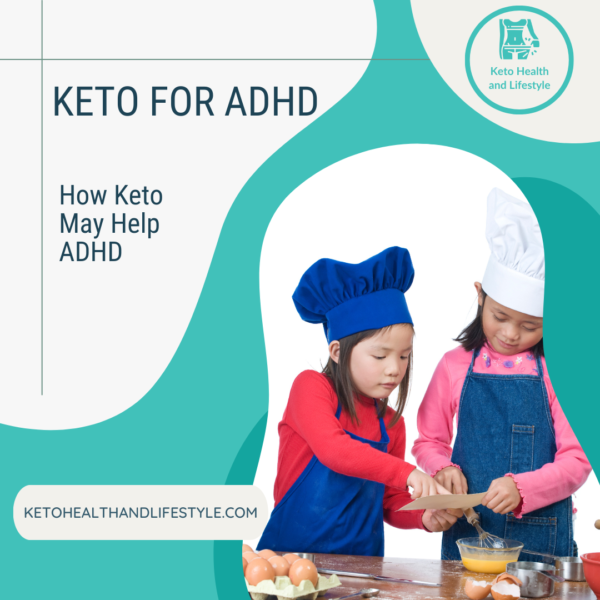
How the Ketogenic Diet May Help ADHD Symptoms
The ketogenic diet, often praised for its benefits in weight loss and managing epilepsy, is now being explored for its potential to aid those with ADHD. This high-fat, low-carbohydrate diet alters the body’s energy source from glucose to ketones, which may have a significant impact on brain health and function. In this section, we’ll explore how this dietary approach might assist with ADHD symptoms through various mechanisms.
Ketones and Brain Function
Ketones are the alternative fuel produced by the liver when the body enters a state of ketosis. This fuel source is not just an energy substitute, it contributes to improved cognitive functions and mental clarity. For individuals with ADHD, the brain’s ability to focus and maintain attention can be tricky. Ketones are believed to enhance mitochondrial function and offer neuroprotection by reducing oxidative stress, which may improve concentration and cognitive performance. Some studies suggest that ketones can bolster neurotransmitter balance, helping the brain operate more smoothly related source.
Reducing Inflammation
Inflammation in the brain has been linked to various neurological disorders, including ADHD. The ketogenic diet has been shown to reduce systemic inflammation, possibly providing relief from ADHD symptoms source discussing inflammation. By lowering inflammatory markers, the diet may shield the brain from the adverse effects of chronic inflammation, leading to better impulse control and decreased hyperactivity.
Gut-Brain Connection
The gut-brain axis is a crucial pathway that influences our mental health. Research has highlighted the link between gut health and ADHD, suggesting that a well-balanced microbiome plays a part in either mitigating or exacerbating symptoms study link. The ketogenic diet may promote a healthier gut environment by reducing harmful bacteria and encouraging the growth of beneficial bacteria. This shift might support better communication between the gut and brain, potentially stabilising mood and cognitive function.
In sum, while there’s still much to learn, the ketogenic diet’s impact on brain function, inflammation, and gut health offers a promising avenue for those managing ADHD.
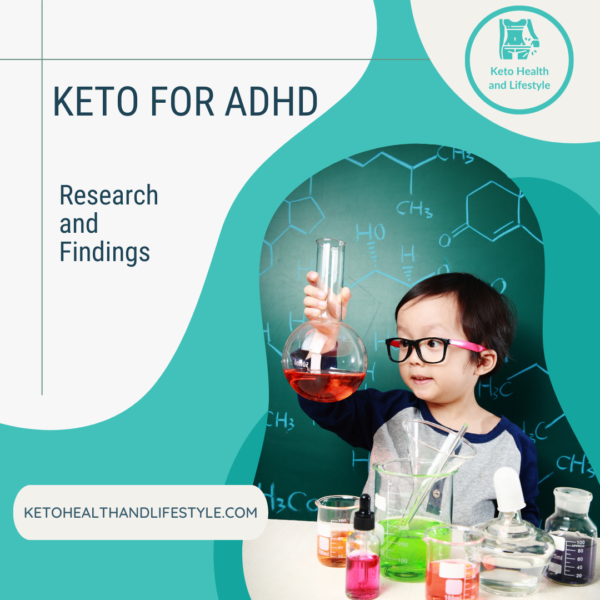
Current Research and Findings
The connection between diet and brain function has always intrigued researchers. The ketogenic diet, originally used for managing epilepsy, has captured attention as a possible way to help with ADHD symptoms. Let’s explore the promising research and insights from experts on this topic.
Clinical Trials and Observational Studies
Numerous studies have taken a closer look at how the ketogenic diet might affect ADHD symptoms. While research is still ongoing, some findings offer exciting insights:
- A study from 2023, published in the National Center for Biotechnology Information, found that the ketogenic diet improved behavioural symptoms of ADHD similarly to medication like methylphenidate (MPH).
- Another research article from ResearchGate concluded that while improvements were noted, they didn’t find a strong relationship between the diet and significant symptom reduction in children.
- Over at Additude Magazine, discussions reveal that early indications suggest a possible reduction in symptoms, but there’s no concrete evidence yet.
These studies are crucial stepping stones, like laying down pieces of a puzzle. While some pieces fit snugly, others require more work to reveal the complete picture.
Expert Opinions
Nutritionists, psychologists, and other professionals offer valuable insights into using the ketogenic diet for ADHD:
- Nutritionists suggest that the diet’s focus on healthy fats and reduced sugar might play a role in managing energy levels and focus. Fat is like fuel; the right kind can run the engine smoothly.
- Psychologists remind us that every individual is unique. They urge caution, as mentioned in Doctor Kiltz’s article, stating that while the diet can support neurological processes, it’s not a one-size-fits-all solution. They stress the importance of personalised approaches and ongoing research.
- Interviews with experts found on Julie Saad’s blog highlight that combining the diet with traditional therapies might offer the best of both worlds.
By weaving together these threads, you can see how the knowledge around ketogenic diets and ADHD is slowly unfolding. This ongoing exploration holds potential, with experts remaining hopeful yet cautious. As new research emerges, we might continue to see shifts that could provide clearer pathways for managing ADHD symptoms naturally.
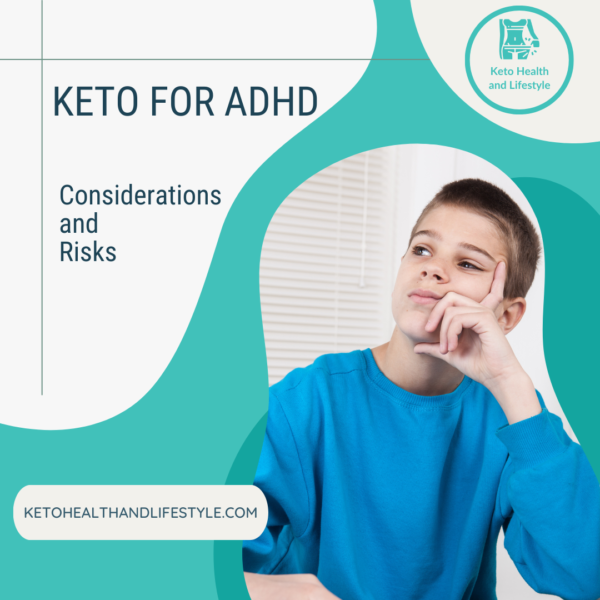
Considerations and Risks
Navigating the ketogenic diet as a potential aid for ADHD management involves careful consideration and awareness of possible risks. This dietary approach has sparked enthusiasm and intrigue, but it’s crucial to understand both its benefits and its challenges. Here’s what you need to know before embarking on this journey:
Nutritional Balance
Ensuring a nutritionally complete diet is the cornerstone of health, particularly when following a specific diet plan like keto. The ketogenic diet, known for its high-fat, low-carb approach, can sometimes lead to nutritional gaps if not carefully managed.
Imagine your body as a complex machine; just as it needs fuel, it also requires the right components to function effectively. With keto, the focus on fats can mean missing out on essential vitamins and minerals often found in fruits, vegetables, and grains, which are limited in this diet. Therefore, it’s vital to:
- Incorporate a variety of nutrient-rich foods: Lean proteins, leafy greens, and nuts can provide essential nutrients.
- Use supplements wisely: Consider supplements to fill in nutritional gaps, but consult with a healthcare provider to ensure they meet your personal health needs.
For more insights on how to maintain nutritional balance on a keto diet, consider reading articles from Harvard’s School of Public Health on the ketogenic diet.
Medical Supervision
When introducing any drastic dietary change, especially to manage a condition like ADHD, medical guidance is non-negotiable. The ketogenic diet can have physiological effects that require monitoring to ensure safety and effectiveness.
Think of this process as charting a course with a trusted navigator. Without guidance, one might end up dodging avoidable obstacles or making missteps. Professional supervision helps tailor the diet to fit an individual’s unique needs and goals. Key aspects to consider include:
- Regular check-ups: Frequent consultations with healthcare providers to monitor progress and health indicators.
- Personalised adjustments: Tweaks and changes to the diet plan may be necessary as reactions to the diet become apparent over time.
For additional reading on how important it is to have medical supervision while following dietary therapies, especially for ADHD, you can explore this resource from ADDitude magazine.
Embarking on a ketogenic diet for ADHD management can be a strategic step, but it calls for careful consideration of nutritional and medical aspects to ensure a safe and effective journey.
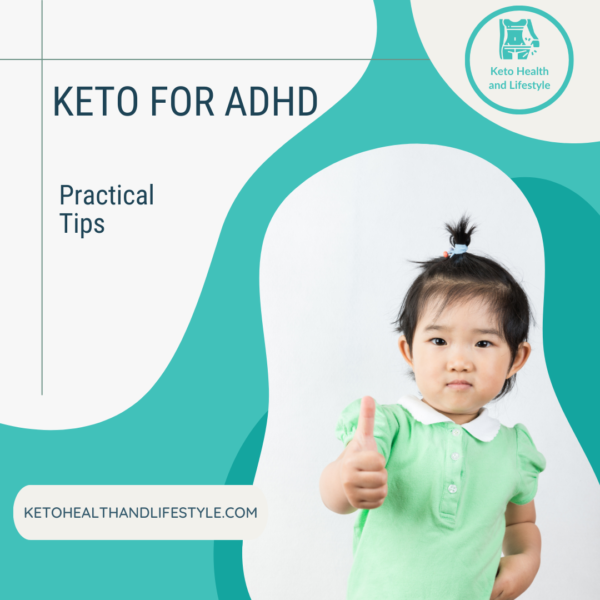
Practical Tips for Implementing Keto for ADHD
Navigating the path of a ketogenic diet to manage ADHD can seem daunting, but with the right strategies, it can become a manageable and even rewarding journey. Let’s look into some practical tips to help you get started.
Meal Planning and Preparation
Meal planning is the backbone of a successful keto diet, especially if your goal is to help manage ADHD symptoms. Creating a structured plan can help maintain consistency and ensure you’re meeting your dietary goals. Here are some tips to guide you:
- Understand the Basics: Focus on high-fat, moderate-protein, and low-carb meals. The key is to keep it simple yet satisfying.
- Create a Weekly Menu: Plan your meals in advance to prevent last-minute decisions that might lead to unhealthy choices. You can find ideas from this Keto Meal Plan for ADHD to help keep you organised.
- Prep in Batches: Cooking in bulk saves time and ensures you always have a keto-friendly meal ready. Consider making large batches of staples like grilled chicken, eggs, or sautéed veggies.
- Incorporate Variety: Though keto might seem restrictive, there are endless possibilities. Mix in different meats, greens, and fats to keep your meals exciting.
- Use Technology: Apps can help you track carbs and find recipes that fit the ketogenic lifestyle. There’s a community feel to using Primal Organic Miami’s tips on meal prep, which can make the transition easier.
Monitoring Progress
Switching to a keto diet involves more than just a change in eating habits. It’s crucial to monitor if and how these dietary changes are impacting ADHD symptoms. Here are strategies to help with tracking progress:
- Symptom Journal: Keep a diary of ADHD symptoms. Note any changes daily or weekly to understand how the diet is impacting behaviour and focus.
- Regular Check-Ins: Set appointments with your healthcare provider to discuss any changes. Their professional insight can be invaluable.
- Use Health Apps: There are apps designed to track your eating habits and symptoms. This data can provide a clearer picture of the diet’s effects on your wellbeing.
- Feedback from Family: Sometimes changes are more noticeable to those around you. Encourage family members to share observations about mood, concentration, and energy levels.
- Refer to Research: While research is ongoing, some studies suggest promising results. For more in-depth insights, you can read this article on the Benefits of Keto for ADHD.
Implementing these tips can not only help you adhere to a ketogenic diet but also provide clarity on its impact on ADHD symptoms. Engaging in this process can help you take charge of your health journey.
Conclusion
Exploring the keto diet as a potential strategy for managing ADHD offers intriguing possibilities. This low-carb, high-fat dietary approach may support neurological processes, potentially aiding in symptom reduction. However, it’s not without challenges; maintaining such a restrictive diet can be difficult and may not suit everyone.
Before making any dietary changes, consulting with healthcare professionals is crucial to ensure it fits individual health needs.
Consider this approach thoughtfully, keeping an open mind to future research and its broader implications for ADHD management. We welcome your thoughts and experiences in the comments. What’s been your journey with ADHD and diet?
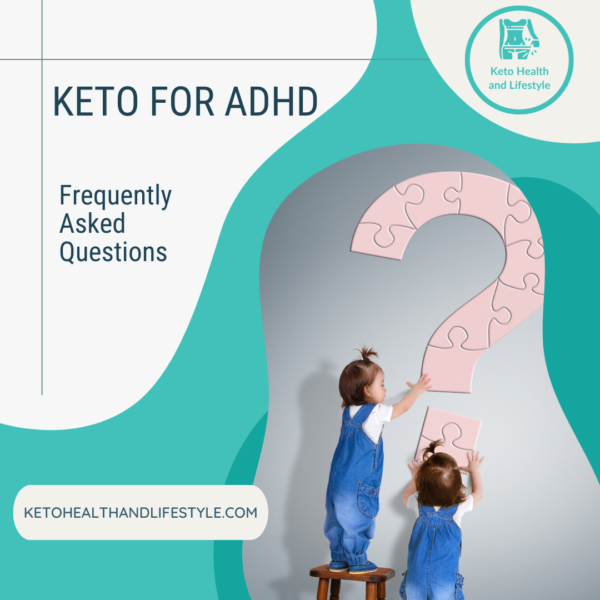
What is the ketogenic diet and how can it benefit ADHD?
The ketogenic diet is a high-fat, low-carbohydrate dietary approach that promotes the production of ketones as an energy source. Research suggests that keto for ADHD may improve focus and reduce impulsivity by stabilising blood sugar levels and enhancing brain function.
Can the ketogenic diet help manage ADHD symptoms in children?
Yes, the ketogenic diet may help manage ADHD symptoms in children by providing a steady flow of energy to the brain, potentially improving concentration and reducing hyperactivity. However, it is essential to consult a healthcare professional before making dietary changes.
Are there any risks associated with following a ketogenic diet for ADHD?
Potential risks include nutrient deficiencies and adverse effects on growth in children. It’s important to ensure a well-balanced intake of vitamins and minerals while following keto for ADHD, under the guidance of a healthcare provider.
How long does it take to see improvements in ADHD symptoms on a ketogenic diet?
Improvements in ADHD symptoms can vary, but some individuals may begin to notice benefits within a few weeks of starting the ketogenic diet. Consistency and adherence to the diet are crucial for optimal results.
Is the ketogenic diet suitable for everyone with ADHD?
While the ketogenic diet may benefit many individuals with ADHD, it may not be suitable for everyone. Factors such as age, health status, and personal preferences should be considered. Consulting a healthcare professional is recommended to determine individual suitability for keto for ADHD.
